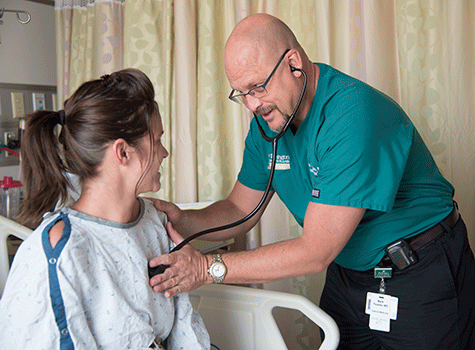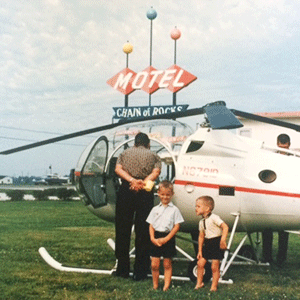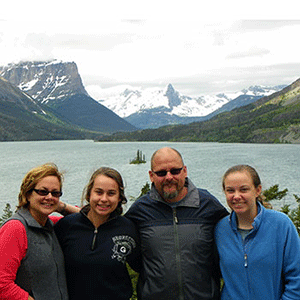
Two weeks before Mark Thoelke was born, his parents bought one of the many mom-and-pop motels that dotted Route 66. The neon lights of the Chain of Rocks Motel in Granite City, Ill., beckoned weary travelers, and the motel offered a well-deserved respite from the road. It also proved to be a formative place for a boy who learned early the value of hard work.
The motel and its pool were a gathering place for neighborhood kids. They played baseball on 12 acres behind the motel. Thoelke’s younger brother allowed the neighborhood kids to swim in the pool — if they played seven innings of baseball first.
At the motel, Thoelke and his brothers learned how to work hard — pulling weeds, playing bellhop and cleaning the pool. They watched their parents work round-the-clock to keep their business going and make it an idyllic stop.
Thoelke’s work ethic has contributed to his success in starting and leading the hospitalist division at Washington University School of Medicine, said Victoria Fraser, MD, the Adolphus Busch Professor of Medicine and head of the Department of Medicine. She calls Thoelke, MD, “the doctor’s doctor,” a term that refers to a physician whom another physician would recommend to family and friends.

“Mark is an incredibly dedicated physician,” Fraser said. “He works very hard and puts in long hours to provide direct patient care to complicated patients with multiple conditions. He always is a patient advocate and uses all of his abilities to make the hospital efficient, to reduce length of stay and to improve outcomes. We are extremely lucky to have him here.”
Robert Mahoney, MD, is an assistant professor of medicine who has worked for Thoelke since the hospitalist division was created. Hospitalists specialize in the care of hospitalized patients.
Mahoney said Thoelke is an effective leader because he shares the work with those he leads. “As I was finishing residency, Mark began to build the hospitalist service,” Mahoney said. “I was happy to join because I knew he would be a committed and equitable leader. When an issue arises, he always is at the front of the line to pitch in. When he speaks, it is from experience, not just from didactics.”
While pursuing a degree in microbiology and working in a lab at the University of Illinois, Thoelke discovered he liked research. He entered an MD/PhD program, where he studied bacterial chemotaxis, the mechanism by which bacteria move in different environments. But the ping-pong-like schedule of the MD/PhD program kept him from engaging in his clinical rotations.
He discovered how much he enjoyed taking care of patients, especially in a hospital, during an internship in medicine. “I loved my internship,” Thoelke said. “I liked the immediate gratification of helping people and feeling confident in my clinical abilities.”
He joined the house staff of Barnes Hospital in 1990, caring for hospital patients and teaching residents and students. Around that time, two physicians at the University of California, San Francisco, published a paper in The New England Journal of Medicine about hospital medicine as a new specialty.
Hospitalists partner with primary care physicians who don’t make hospital calls and care for patients who don’t have primary care physicians. Today, hospital medicine is the fastest growing medical specialty.

“I remember reading the article and thinking, ‘This is what I want to do,’” said Thoelke, an associate professor of medicine. “It was appealing because I enjoyed the practice of medicine in a patient setting, wanted to use my clinical skills on more complex problems and also greatly enjoyed teaching.”
Thoelke and Gerald Medoff, MD, a professor of medicine, started a hospitalist program in 1999. Thoelke, Medoff and John Lynch, now a professor of medicine at the School of Medicine and vice president and chief medical officer of Barnes-Jewish Hospital, helped create the Washington University Division of Hospitalist Medicine in 2000. The division, which began with five physicians, initially was given probationary status. Thoelke and Lynch were told they had a year to make it work.
Today, the division has 65 physicians, two nurses and six nurse practitioners. Medoff credits much of the division’s success to Thoelke.
“Mark is an exceptional physician who is completely committed to providing excellent care to our patients in Barnes-Jewish Hospital,” Medoff said. “He also is a gifted teacher and administrator, and he has a talented team. All of these qualities are responsible for the success of the program at BJH. Under his leadership, the program has grown to its present level of excellence.”
Thoelke acknowledges there are special challenges in hospital medicine. Hospitalists have to make extra efforts to establish trust with sick and vulnerable patients they don’t know. “But someone on our staff is at the hospital 24 hours a day,” he said. “We’re there to discuss lab results immediately and help if there’s a medical crisis. We’ve demonstrated that it’s an efficient system without sacrificing quality.”
When Thoelke isn’t working, he enjoys hiking, biking and traveling. For old time’s sake, a couple of years ago, he and his wife, Gail, and daughters Mariah, 20, and Jessica, 16, stayed in a few motels along Route 66 on a road trip to Chicago. His family also has explored a number of national parks. No matter where he is — and even when his cellphone service is spotty — he’s checking on the hospitalist division.
“Mark’s vacations usually send him to far-flung areas of the National Park system,” Mahoney said. “Despite being hours from the nearest civilization, he somehow manages to keep an eye on work and even get in an email or two. Imagine our delight! He’s been dedicated and hard working as long as I’ve known him.”